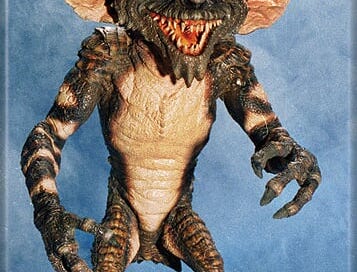Hey friends!
Over the last few weeks, on all my travels, I’ve talked to a lot of writers about comps—comparable titles that you use in a query or book proposal. Comps are supposed to say my book will be as popular as this book! And my book will sell as many copies this book!1 And readers of X book will like my book! And elements of X book are also in my book! That’s a lot for a handful of comps to do. And remember, you don’t want to Frankenstein your comps.
So here’s what I came up with. Let’s say your friend just saw the classic 1984 movie Gremlins. What are Gremlins? Cute little furry things that turn in to snarling chaos monsters if you feed them after midnight. Herewith.
Your friend loved it! They ask you, a movie expert, for other movies that are like Gremlins. And you say:
They both have cute(ish) funny little chaos monsters in them! That means you friend will like both movies, right?????
I mean, they might! But this misunderstands the essence of your friend’s question. Gremlins and Lilo & Stitch do have little monster type things in common, but that’s almost it. And moreover, they are very different kinds of movies. One’s a comedy horror movie with bad 80s special effects and the other is a heartwarming, animated Disney movie. A better suggestion for you friend might be E.T. (80s movies, a little scaryish, similar special effects) or Chucky movies (horror movie, supposedly cute things come to life) or heck, even Beetlejuice (humor + light horror) is more like Gremlins than Lilo & Stitch.
Don’t Lilo & Stitch your comps in your query letter. A book set in Baltimore (1885) is not automatically a comp for your book set in Baltimore (2025). A book with a wedding in it is not just like your book that also has a wedding in it. You have to consider the vibes of the comps you’re suggesting. You can qualify your comps in your query letter, by saying something like My book is like Gremlins if Disney made it a cute, animated movie, and that would communicate some clearer vibes. But comps that are closer in vibes are better than not.
The goal is to give the reader (an agent) a feel for your book. What’s the reading experience like? How does your book fit in the overall genre? What kind of reader will gravitate to your book, drawn in by the vibes? Yes, you will likely choose comps that (you assume) have sold very well, and that’s good. Obscure comps have the dual drawback of being lesser-known and probably lower-selling. But unless you have a subscription to Bookscan, which you don’t, then you can’t know anything for sure about sales, so in a query, focus on vibes.
MAJOR CAVEAT: if you’re writing non-fiction, you’re going to have to think more about sales, even if you still don’t have a subscription to Bookscan. You still don’t want to Gremlins/Lilo your comps, even if you have little sales information. You should not comp you book about quitting your job to a book about divorce, even if both are about break-ups, in a way. But non-fiction comps are often easier to come up with than fiction comps, so you’ll be ok at the query/proposal stage.
In both cases, agents will help you fine tune your comps before it goes to an editor. Those comps will be more sales focused, still with an eye on vibes. Your agent will help you find out sales numbers to be sure. Editors use comps to make a profit and loss statement for the potential book, so numbers are more important there. But that’s later. I’ve never rejected anything because the comps were subpar in a query. Even for non-fiction. Comps can be fixed.
So, it’s vibes, my friends. It’s all just vibes.
OXOXOXOOX,
Kate
Popular is different than sells a lot!





If I were an agent (hey there's a good 'stack title for one of us) I would skip the query letter, the comps, the bio (well, probably not the bio) and go straight to the writing. The greatest query in the world isn't going to fix bad writing. And the worst query in the world isn't going to wreck superb writing
I struggled with comps for my first novel. Was texting my goddaughter about it, and the exchange devolved into an Absurd Comp competition.
“It’s like Pride and Prejudice meets the Muller Report.” “Think: ‘Rime of the Ancient Mariner’ meets Junie B Jones.” (Fortunately, the publisher had saner ideas).